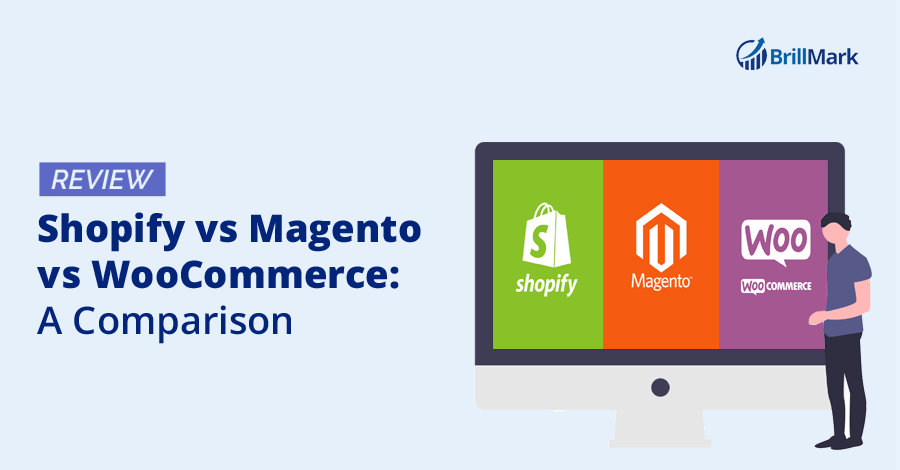The struggle is real when deciding which e-commerce platform will work best for you, especially if you want it to be budget-friendly, have great support, and have the potential to scale in the future. In our experience, the bulk of e-commerce sites on the internet are powered by Shopify, Magento, and WooCommerce.
However, the burning question remains unsolved: Which is the best e-commerce platform for you among these three? The only way to answer this is to do a complete assessment and study each major e-commerce platform’s critical factors, which may seem impossible — and nonetheless, you still want the best system for your needs.
In this article, we’ll help you explore and understand the options by giving some high-level information about the three platforms, which will help you choose the right platform for your needs. Here’s the shortened version, with each category, explained in further detail below.
| Features | Shopify | Magento | WooCommerce |
| Launch Date | 2006 | 2008 | 2011 |
| Overview | Shopify is among the world’s leading e-commerce startups. Shopify is widely regarded as the best platform for an all-in-one e-commerce platform that allows you to establish an online store, manage your items, and process orders, all from a single dashboard. | Magento is one of the most popular and sought-after e-commerce systems among merchants all around the world. It has one of the most extensive feature sets in the industry, making it suitable for high-aspiration retailers. | WooCommerce is the world’s most popular and efficient e-commerce platform. WooCommerce is a WordPress-based, open-source e-commerce system. It functions as a WordPress plugin, allowing you to build a functioning online store on a WordPress site. |
| Websites | 4,000,000+ | 7,00,000+ | 4,000,000+ |
| Site Performance | High | High | High |
| Scalability | Yes, but only with Shopify Plus | Yes | Not if you’re unfamiliar with coding — requires developer assistance, advanced hosting |
| SEO | Yes | Yes | Yes |
| Ease Of Use | Easy | Difficult | Easy |
| Customer Service | 24×7 | Yes (with Enterprise Edition) | Yes (Support Forum) |
| Security | High | High | High |
| Domain Name and Hosting | Yes |
Premium, yes; Community, no |
No — it is a plugin that works with WordPress sites |
| Analytics | Google Analytics + System Analytics | Google Analytics + System Analytics |
Google Analytics + System Analytics |
| Cost | Starting at $29 | Premium or Free | Free |
| Conclusion | Shopify is the best platform for small businesses looking to expand their online presence. | Magento is the best choice for large companies with a lot of resources. | WooCommerce can work effectively for small and medium-sized businesses. |
Overview
Shopify
Shopify is among the world’s leading e-commerce startups. It’s widely regarded as the best platform for an all-in-one e-commerce platform that allows you to establish an online store, manage your items, and process orders all from a single dashboard. The best part of Shopify is that it is user-friendly, doesn’t require you to buy SSL or CDN, provides themes, and offers both support and communities.
Magento
Magento is one of the most popular and sought-after e-commerce systems among merchants all over the world. It has one of the most extensive feature sets in the industry, making it suitable for high-aspiration retailers.
WooCommerce
WooCommerce is the world’s most popular and efficient e-commerce platform. It’s a WordPress-based, open-source e-commerce system that functions as a WordPress plugin, allowing you to build a functioning online store right on a WordPress site.
Users
Shopify
Shopify growth experienced a massive increase in users over the last few years. Currently, it’s used on over 4,000,000+ websites.
Magento
Since 2011, the number of Magento-powered websites has been constantly increasing. Currently, it’s used on over 7,00,000+ websites.
WooCommerce
WooCommerce is an easy-to-use plugin, with millions of users. Currently, it’s used on over 4,000,000+ websites.
Site Performance and Scalability
Shopify
When it comes to website speed and performance, Shopify performs admirably. One of its primary advantages is increased website speed. When it comes to scalability, it falls short. which may be a challenge for your organization if you’re looking to grow. For seamless scalability, you’ll have to adopt Shopify Plus, which will significantly raise the cost.
Magento
Magento is extremely powerful and can easily handle multiple products as well as heavy website traffic. Magento is also extremely scalable, allowing you to simply raise or reduce the resources required by your server based on website traffic.
WooCommerce
If you already have a hosting provider that can scale at the rate you want your WordPress website to grow, you can attain the speed you want with any project size using WooCommerce. Although WooCommerce enables scalability, users who are unfamiliar with coding may find it challenging to scale their websites to meet their demands.
Ease Of Use
Shopify
Shopify doesn’t require any prior experience in coding or website construction to get it up and running. Shopify provides the most seamless user experience, allowing merchants to provide their clients with an excellent user experience.
Magento
Magento is a somewhat difficult platform that does not provide on-site developers to help you build your website. It’s recommended for people with (at least) a basic understanding of web programming — or you’ll need to hire an expert.
WooCommerce
If you have a basic knowledge of WordPress, the platform is fairly simple to utilize. However, in most circumstances, you will need some adjustments, which is where WooCommerce becomes difficult — especially if you are not a coding expert.
Customer Service
Shopify
Customers can contact Shopify’s support team by phone, email, chat, or social media. This is available 24 hours a day, 7 days a week.
Magento
Although the Magento community version is free to download and use, its customer service is limited and inadequate. However, if you use the business extension, you’ll get exceptional customer service and assistance from Magento technical support.
WooCommerce
Since WooCommerce is free, assistance is rather limited. All retailers and developers have access to the source code, from which they can troubleshoot bugs and report them to WooCommerce support.
Security
Shopify
Shopify is as secure as any other top-tier e-commerce platform. It’s regarded as the most reliable e-commerce platform by the majority of merchants.
Magento
Magento was the first e-commerce platform that prioritized data protection. It offers remarkable performance and security processing capabilities.
WooCommerce
The WooCommerce platform provides impressive security measures to safeguard merchant data and other critical information.
Domain Name and Hosting
Shopify
All plans include a free “myshopify.com” subdomain, or you can connect your custom domain name. Hosting is provided as well.
Magento
The Community edition necessitates the purchase of a domain name and hosting on your own. However, hosting is included in the premium package.
WooCommerce
Domain and hosting are not included, because it’s a plugin that works with WordPress sites — so you’ll need to make further investments if you want to access these features.
Analytics
Shopify
Shopify has its own analytics platform as well as the ability to interface with Google Analytics.
Magento
Magento also has its own analytics platform, which is now known as Magento Business Analytics, but it can also be integrated with Google Analytics.
WooCommerce
The new update in WooCommerce has the functionality of WooCommerce analytics, but it can also be coupled with Google Analytics by utilizing relevant WordPress plugins.
Cost
Shopify
Shopify has three plans:
- Basic Shopify is $29 a month — this is best for beginning enterprises or those transitioning from online to in-person sales.
- The standard Shopify plan is $79 per month — this is best for developing enterprises with a single retail location.
- Advanced Shopify is $299 per month and includes all of the other plans’ capabilities. It’s ideal for expanding enterprises with two or more retail locations.
Shopify also provides a 14-day free trial for businesses to become acquainted with the Shopify platform before utilizing it fully, and you don’t have to provide any financial information to use it.
Magento
As we mentioned above, Magento offers two price options: community and enterprise. Magento’s community version, often known as the open-source edition, is free to download and use. However, the capabilities of the open-source variants are severely limited. This version is an excellent choice for small enterprises with limited budgets.
The other option is the enterprise version, which is an excellent choice for medium- to large-sized organizations. The cost of the community edition is determined by the size of your company.
WooCommerce
WordPress and WooCommerce are free to use and may be downloaded from the WordPress website. As a result, tiny and low-budget businesses can use this platform to build their online storefronts. Nonetheless, you must pay for a domain name, an SSL certificate, or website hosting to operate your WooCommerce store.
A domain name is typically around $15, an SSL certificate is typically free but could cost up to $65 per year, and a hosting service is around $120 per year. Furthermore, as your site grows, you’ll see that the basic WooCommerce shop is limited in its potential. As a result, you must pay for third-party plugins to improve the functionality of your store.
Conclusion
In the intro above, we acknowledged that the biggest question when starting an online store is which e-commerce platform to choose for your business. The honest response, as is frequently the case with these kinds of queries, is: It depends. When picking which eCommerce platform to utilize, several considerations come into play, including your technical abilities, budget, shop size, and desired functionality, to mention only a few.
- Shopify is the best platform for small businesses looking to expand their online presence.
- Magento is the best choice for large companies with a lot of resources.
- WooCommerce can effectively power small and medium-sized businesses.
We hope this article has provided you with enough information to help you determine which e-commerce platform is appropriate for you. In addition, If you think you might choose any of the above platforms, we have an experienced team that can set up your e-commerce profile and adjust the themes for your online store. You may rely on our well-regarded Shopify Development Service, WooCommerce Development Services, and Magento Development Services teams to handle everything from the initial setup of an online store to its ongoing management. Because of our expertise with numerous themes and our understanding of Liquid files, we can quickly explore, identify, and address issues.
Brillmark is well-versed in these areas because, for over ten years, we’ve been managing to test for clients that need extensive experimentation.
Ping us now to find out more.












